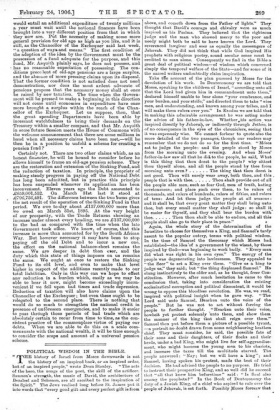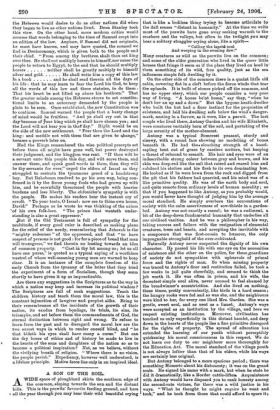POLITICAL WISDOM IN THE BIBLE.
" HE history of Israel from Moses downwards is not 'the history of' an inspired book, or an inspired order, but of an inspired people," wrote Dean Stanley. "The acts of the hero, the songs of the poet, the skill of the artificer. Samson's strength, the music of David, the architecture of Bezaleel and Solomon, are all ascribed to the inspiration of the Spirit." The Jews realised long before St. James put it into words that "every good gift and every perfect gift is from
would entail an additional expenditure of twenty millions above, and cometh down from the Father of lights." They' thought that David's courage and chivalry were as much inspired as his Psalms. They believed that the righteous judge and the man who showed mercy to the poor and needy might both be said to have known the Lord. They reverenced lawgiver and seer as equally the messengers of Jehovah. They did not think that while God inspired His prophets with religious poetry, sound secular sense must be credited to man alone. Consequently we find in the Bible a great deal of political wisdom—of wisdom which concerned simply the temporal welfare of the State—and for some of it the sacred writers undoubtedly claim inspiration. Take tie account of the plan pursued by Moses for the devolution of his work. In Deuteronomy we are told that Moses, speaking to the children of Israel, "according unto all that the Lord had given him in commandment unto them," declared himself unable to bear alone "your cumbrance, and your burden, and your strife," and directed them to take "wise men, and understanding, and known among your tribes, and I will make them rulers over you." In Exodus we are told that in making this admirable arrangement he was acting under the advice of his father-in-law. Whether.his action was inspired directly by Jehovah, or indirectly through Jethilo, is of no consequence in the eyes of the chroniclers, seeing that it was supremely wise. We cannot forbear to quote also the more detailed of the two passage, though our readers may remember that we do not do so for the first time. " Mises sat to judge the people: and the people stood by Moses from the morning unto the evening. And when Moses' father-in-law saw all that he did, to the people, he said, What is this thing that thou doest to the people ? why sittest thou thyself alone, and all the people stand by thee from
morning unto even ? The thing that thou doest is not good. Thou wilt surely wear away, both thou, and this.
people that is with thee Thou shalt provide out of all the people able men, such as fear God, men of truth, hating covetousness ; and place puch over them, to be rulers of thousands, and rulers of hundreds, rulers of fifties, and rulers of tens : And let them judge the people at all seasons : and it shall be, that every great matter they shall bring unto thee, but every small matter they shall judge : so shall it be easier for thyself, and they shall bear the burden with thee Then thou shalt be able to endure, and all this people shall also go to their place in peace." •
Again, the whole story of the determination of the Israelites to choose for themselves a King, and Samuel's tardy assent to the popular outcry, teems with political wisdom. In the time of Samuel the theocracy which Moses had, established—the idea 'of a government by the wisest, by those inspired by God—was beginning to work badly. "Every man. did what was right in his own eyes." The energy of the people was degenerating into lawlessness. They appealed to "the Seer" to set a King over them. "Give us a king to judge us," they said; but "the thing displeased Samuel." He clung instinctively to the older and, as he thought, freer Con- stitution. However, after much hesitation he came to the conclusion that, taking into consideration the existing ecclesiastical corruption and political discontent, it would be wrong to oppose this bloodless revolution. He was, we read; inspired with political insight when he gave way. "The Lord said unto Samuel, Hearken unto the voice of the people." But he was not to act without forcing the people to further thought. ."Hearken unto their voice, howbeit yet protest solemnly unto them, and show them the manner of the king that shall reign over them." Samuel then put before them a picture of a possible tyrant, —a portrait no doubt drawn from some neighbouring heathen chief. They must consider, he said, the possible fate of their sons and their daughters, of their flocks and their herds, under a bad King, who might live for self-aggrandise- ment, who might harness the young men to his chariots, and increase the taxes till the multitude starved. The people answered : "Nay; but we will have a king"; and Samuel, having spoken his 'protest, made the best of their decision. He had advised the people to no purpose. He tried to instruct their prospective King, and so well did he succeed that "all that knew him beforetime " said : "Is Saul also among the prophets ?" In the Book of Deuteronomy the duty of a Jewish King, of a chief who aspired to rule over the people of Jehovah, is set forth. Possibly ?Loses foresaw that
the Hebrews would desire to do as other nations did when they began to live as other nations lived. Dean Stanley took this view. On the other hand, more modern critics would assume that words belonging to the time of Samuel crept into an edition of the law. Anyhow, if Samuel did not originate, he must have known, and may have quoted, the counsel we find in Deuteronomy, which is given both to the people and their chief. "From among thy brethren shalt thou set king over thee. He shall not multiply horses to himself,nor cause the people to return to Egypt, to the end that he should multiply horses neither shall he greatly multiply to himself silver and gold He shall write him a copy ef this law In a book and he shall read therein all the days of his life : that he may learn to fear the Lord his God, to keep all the words of this law and these statutes, to do them : That his heart be not lifted up above his brethren." That the greater minds among the Hebrews strove to set constitu- tional limits to an autocracy demanded by the people is plain to be seen. Once established, the new Constitution was to continue. Samuel warned the people that a hasty change of mind would be fruitless. "And ye shall cry out in that darbecause of our king which ye shall have chosen you ; and the Lord will not hear you in that' day." Right would be on the side of the new settlement. "Fear thou the Lord and the king : and meddle not with them that are given to ahange," became a proverb later on.
Had the Kings remembered the wise political precepts set before them all might have gone well, but power destroyed their judgment, and the kingdom was rent. "If thou wilt be a servant unto this people this day, and wilt eerie them, and answer them, and speak good words to them, then they will be thy servants for ever," urged the elders of Israel as they struggled to restrain the tyrannous greed of a headstrong boy. But Rehoboam resolved to go his own way, being con- firmed in it by the fierce young fools who had grown up with him, and he scornfully threatened the people with heavier burdens and less liberty. The chknicler's sympathy is with the people. He makes his readers hear the instant cry of revolt. "To your tents, 0 Israel: now see to thine own house, David." Perhaps as he wrote he was thinking of the axiom 'of his own folk-lore. "The prince that wanteth under- standing is also a great oppressor."
But if the Old Testament is full of sympathy for the multitude, if every good ruler is described as making plans for the relief of the needy, remembering that Jehovah is the "mighty redeemer" of the oppressed, and that "to have respect of persons is not good : for for a piece of bread that man will transgress," we find therein no leaning towards an idea of common property. "Cast in thy lot among us ; let us all have one purse," is quoted as a typical saying of a worthless wastrel of whom well-meaning young men are warned to keep clear. It is an instance of the complete freedom of the early Church from the tyranny of the letter that they tried the experiment of a form of Socialism, though they seem shortly to have given it up as impracticable.
Are there any suggestions in the Scriptures as to the way in which a nation may keep and increase its political wisdom ? The Scriptures are fall of such suggestions. Teach the children history and teach them the moral law, this is the constant injunction of lawgiver and prophet alike. Bring to their remembrance all the incidents of the growth of their nation, its exodus from bondage, its trials, its sins, its triumphs, and set before them the commandments of God, the eternal distinction between right and wrong. To refuse to learn from the past and to disregard the moral law are the two surest ways in which to render oneself blind, and "he that hideth his eyes shall have many a curse." But can the dry bones of ethics and of history be made to live in the hearts of the sons and daughters of the nation so as to become a political inspiration ? Not, as we believe, without the vivifying breath of religion. "Where there is no vision, the people perish." Expediency, however well understood, is a lifeless principle. Motive force.lies only in an inspired ideal











































 Previous page
Previous page